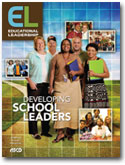I've never made more enemies than I did while sitting on a panel of teacher leaders at a conference for principals. Our task was to help a room full of administrators understand the role teachers could play in driving change in schools.
Halfway through our presentation, I ruffled more than a few feathers. "Although experts insist that instructional leadership comes from the principal's office," I argued, "few teachers look to administrators when selecting instructional practices worth pursuing."
As soon as the words came out of my mouth, agitated principals lined up to grab the microphone. "Who do you think you are, claiming to know more about teaching and learning than principals?" one irate principal shouted. "Have you got a degree in administration?"
Although I'll admit that my choice of audience was poor and my delivery rough, I'll stick by my assertion. Better yet, I'll back it up with numbers: In a 2008 survey of 104,000 North Carolina classroom teachers, just 45 percent viewed their principal as "the person who most often provides instructional leadership" in their schools. This mirrored the results of a 2006 survey of more than 80,000 North Carolina teachers. I'd argue that as technology plays a larger role in teaching and learning, principals are falling further behind.
Why Digital Natives Need You
Don't get me wrong: I'm certain most principals care as deeply about creating environments that ensure student success as classroom teachers do, and some do keep up with developments in instruction and exchange ideas with teachers. But "instruction" today looks far different than it did when most principals left the classroom. Many teachers and students have embraced blogs, wikis, RSS feeds, and other applications as ways to learn and to share what they've learned. But although the procedures are simple, learning through online connections in a school setting is complex. Teachers—even digital natives—need encouragement and advice.
This is why school leaders must become digital learners. Administrators who lack a fluent understanding of the tools that are redefining learning can't provide high levels of instructional leadership to their faculties.
RSS: Rafts in the Information Sea
One set of important tools that are redefining learning are information aggregators, online applications that help users sift through the sea of new content created on the Web each day. Also known as RSS (real simple syndication) feed readers, information aggregators can be programmed to automatically monitor key Web sites for specific kinds of information related to teaching and to notify users instantly when new materials are posted.
RSS feeds are available for many kinds of online content. Feed readers can help you keep up with appointments or track developments in students' digital projects. Far from being an intimidating new source of information, feed readers enable you to control how many updates you receive from Web sites you follow and to access a wide range of information easily.
My feed reader is a super-efficient information filter for everything digital in my life. I use Pageflakes (www.pageflakes.com)—a free Web-based feed reader with an appealing layout—to follow different types of information, including current events in countries my 6th grade social studies class is studying (www.pageflakes.com/wferriter/16714925) and my students' digital projects (www.pageflakes.com/wferriter/16617706). Updates to each of the sites I monitor appear as links in individually titled boxes called "flakes," allowing me to quickly scan new content from different Web sites in one location. Other popular readers include Bloglines (www.bloglines.com) and Google Reader (www.google.com/reader).
Getting started with Pageflakes is as simple as creating a free account and then selecting a collection of frequently updated Web sites you'd like to keep track of. Maybe you'd like to read bloggers like Scott McLeod (www.dangerouslyirrelevant.org) or Chris Lehmann (www.practicaltheory.org/serendipity) who write about school leadership. Instructional experts like Will Richardson (http://weblogg-ed.com) might provide new ideas for your teachers.
Once you've identified sites you'd like to follow, add their "feeds" to your information aggregator. To do this in Pageflakes, click on the yellow snowflake icon on the main page, select the "Add RSS Feed" button on the bottom left corner of the menu that appears, then paste in the URL of the site that you're hoping to follow. If the Web site provides an RSS feed—and most do—Pageflakes will automatically add a new box to your main page that includes links to the five most recent articles posted on that site. And it will check that site several times a day, retrieving links to any new content posted. Browsing the Web for new ideas goes from a time-consuming grind requiring stops at dozens of pages that may or may not have new material to a "one-stop" experience: Just log in to your aggregator and quickly see new content from all your favorite sites at once.
Once you've set up RSS feeds, visit your aggregator at least once a day. Find interesting ideas to share with your teachers or administrative team. You might create collections of feeds that would interest teachers, parents, and students. Challenge each of your professional learning teams to organize a set of shared feeds about relevant topics and to discuss what they read through those feeds at weekly meetings.
As you use tools like RSS to access cutting-edge instructional ideas, you'll understand how new technologies change the way students and teachers interact with information and other learners. You'll be able to point out how teachers can integrate the new literacies you're mastering into teaching. And you'll become a model of courage for colleagues hesitant to change the way they learn.
